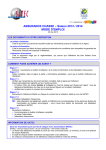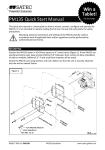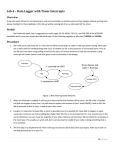Download PM130 PLUS Quickstart
Transcript
PM130 PLUS Quick Start Manual This Quick Start Manual is a short guide on how to mount, connect, configure and operate the PM130 PLUS. It is not intended to replace reading the full User Manual – and particularly the safety precautions. The manual is available on the Product Documentation CD. Mounting, electrical connection and settings of the PM130 shall be made in accordance with all applicable laws and/or regulations and be performed by authorized personnel only. MOUNTING Position the PM130 meter in 92×92mm square or 4” round cutout (Figure 1). If two PM130 are positioned side by side, keep at least 150mm (5.9”) between their centers to allow installation of add-on modules (140mm/5.5” if only small form modules will be used). Attach the PM130 unit using washers and nuts. Make sure that the unit is securely attached into the wall or cabinet fixture. Figure 1 BG0441 REV.A9 ENGLISH PM130 PLUS QuickStart www.satec-global.com CONNECTION To connect follow these steps (Figure 2 shows a 4W LV installation with conventional CTs): 1. Ensure that all incoming power sources are OFF. 2. Check that you have the appropriate power supply. 3. Connect the Power Supply inputs using 1.5 mm²/14AWG dedicated wires and breaker. 4. Connect to the external CTs by passing the external CTs wires through the meter CT cores. Observe the arrow that indicates the current direction (Figure 2A). For HACS: connect the red or white wire to the “-” and orange or black wire to the “+“ terminal. 5. In case of a retrofit application where each external CT ends with two wires (Note 2B): 5.1. Pass one wire through the meter CT core. 5.2. Connect the wire to one of the meter “optional CT wire termination” screws. 5.3. Connect the second wire from the external CT to the termination screw. 6. Connect the measured voltage inputs 7. Connect COM1 – RS-485 communication port 8. To connect the optional module: 8.1. Make sure that the power is turned off 8.2. Remove the module cover 8.3. Attach the module and fasten the screws 8.4. Connect the module I/O or communication (see Figure 2C for DI/O wiring) 9. Turn the power up 10. Make sure the diagnostic led is off Figure 2 Figure 2C Figure 2A Note 2B The “optional CT wire termination” allows connection of the two wires from the CTs. They have no internal connection and their use is optional. PM130 PLUS QuickStart www.satec-global.com OPERATION The PM130 PLUS is operated using the front panel which consists of a 3-line 7-segment display, up to 33 LEDs (depending on model) and six keys as shown below: Load bar graph (full load according to CT or in Display Setup) Diagnostic LED. Off = OK Main Display Displayed parameters Calibration LED (1 pulse/Wh or Varh) Communication indication Measurement scale Min/Max/Max Demand button & indication Energy button & indication (E/EH models) / Enter Harmonics button & indication (EH model) / Escape Scroll up / down Select There are two display modes: readings and menus. Readings Mode There are four groups of readings: Common measurement, Min/Max, Harmonics and Energy. Use MAX/MIN or HIIIIII or ENERGY to switch between groups, or to scroll within the group, or simultaneous and to go to the first screen of the current display group. Menu Mode Press SELECT to enter menu mode (blinking line indicates the selection). SELECT to change the selection, ENTER to drill down or ESC to go up. In editing mode use or to change the value (a number or submenu), ENTER to accept it, or ESC to cancel. The following chart shows the structure of the menus: (Status) Status Indications Phase rotation Voltage angles Current angles Relay status (*D) . DI status (*D) Counter value in 0.1 hours . Alarm setpoint Diagnostics . Serial number Firmware version GPRS status (*G) NOTE: (Options) Read-only display of the configuration screens (Change) Configuration Real Time Clock Basic configuration .COM2 setup .COM2 setup (*E/G/R/P) Relay Output (*D) Analog Output (*A) Network configuration (*E) Setpoints Display Options Reset min/max, demands, etc. Same as OPS (Options) menu Option availability depends on installed add-in module: *D – Digital I/O; *A – Analog Output; *E – Ethernet; *G – GPRS; *R – RS232/422/485; *P – Profibus. PM130 PLUS QuickStart www.satec-global.com CONFIGURATION The essential configuration includes: 1. Basic measurement setup 2. Communication setup and testing 3. Resetting the min/max, energy, demands etc. Additional recommended configuration: set points, TOU and data logging Note: It may be easier first to configure communication and use PAS software for setup Basic Measurement Setup In any display screen, press SELECT x 3 (until blinks), then press ENTER ( blinks), then x 2 () and ENTER to enter the Basic Settings Display. Parameter (see below) . . (E & EH models) . (E & EH models) . Description Network wiring configuration Transformation ratio of the Potential Transformers Additional PT factor for EHV network The Primary Rating Of The Current Transformers (quick access to this parameter: press SELECT, then simultaneous and SELECT) Duration in minutes of the power demand period calculations E = External pulse in DI1 The number of blocks to be averaged for sliding window demands Duration in seconds for voltage and current demand The nominal frequency Max. Demand Load Current in Amperes. 0 = CT primary current. Default Wiring Mode Setup 3-wire 2-element Delta direct connection using 2 CTs 4-wire 3-element Wye direct connection or 3PTs, and 3 CTs or * 3-wire 2-element Open Delta connection using 2 PTs, 2 CTs 4-wire 2½-element Wye connection using 2 PTs, 3 CTs or * 3-wire 2½-element Open Delta connection using 2 PTs, 3 CTs 4-wire 3-element Delta direct connection using 3 CTs or * 3-wire 2½-element Broken Delta connection using 2 PTs, 3 CTs or * * LN or LL denotes the default use of L-L or L-N voltages (in thresholds, min/max, demands etc.) Communication setup and testing blinks), then press ENTER ( blinks), In any display screen, press SELECT x 3 ( then x 3 (.) and ENTER to setup the built in RS-485 port (COM1). If communication module is present, configure also COM2. Resetting the min/max, energy, demands etc. In any display screen, press SELECT x 3 ( blinks), then press ENTER ( blinks), then ENTER to enter the reset menu. Select the value to be reset, press SELECT to select, then press ENTER for 5 seconds until the notification is changed to . WI! PM130 PLUS QuickStart Copyright © 2013 SATEC Ltd. www.satec-global.com














